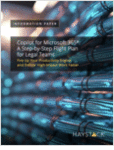A Fort Lauderdale jury awarded more than $4.6 million today in a legal malpractice case against the defunct Ruden McClosky law firm for losses in its in-house investment firm.
The jury took a little more than three hours to award Ryan Gill the amount he sought for his actual losses plus what he could have earned in a low-risk investment.
Gill, one of three siblings who inherited a fortune from the Yankee Trader Hotel and the Yankee Clipper Hotel built by his grandfather in Fort Lauderdale, was a client of former Ruden attorney Patrick Moran, who has since moved to Michigan.
Its a story about opportunistic attorneys and the targeting of Ryan Gill, Gills attorney, Jan D. Atlas of Kopelowitz, Ostrow, Ferguson, Weiselberg, Keechl in Fort Lauderdale said in closing arguments before Broward Circuit Judge Jeffrey Streitfeld.
Atlas described Gill as a simple man with a limited education not the sophisticated investor that the defense tried to paint who was introduced to the law firm by his mother.
The law firms Ruden McClosky Capital Partners Ltd. had two hedge funds: Capital Partners High Yield Mezzanine Fund LLC and Capital Partners Global Asset Fund LLC.
Gill first discussed with Moran what to do with $500,000 he received from an accident award. Moran referred Gill to the firms in-house fund manager, and Gill transferred the money in 2004 into the High Yield Mezzanine Fund. Two years later, Gill came into his inheritance and put $3 million in the Global Asset Fund.
Atlas claimed Gill was not told the funds were high risk or that Moran and the law firm had conflicts of interest. They earned legal fees off the transactions, and Moran had a 50 percent principal interest in both funds.
Atlas reminded jurors about the testimony of his expert witness, appellate attorney Bruce Rogow, who said conflicts of interest must be disclosed in writing and obtaining informed consent from the client is critical.
Defense attorney Pedro Luis Demahy of Demahy, Labrador, Drake, Payne & Cabeza in Coral Gables responded that Moran never made a dime off the hedge funds.
He could have exercised his interest early and taken $1 million, Demahy said, but Moran did not, and he lost money.
Demahy insisted the contract documents had about 50 disclosures about Rudens involvement and its connection to the in-house investment firm. He recalled the testimony of a Bank of America officer who said the bank agreed to review Gills hedge fund and offer an opinion.
A bank officer told Gill in 2006 that the investment was high risk and cited conflicts of interest.
He does nothing with this information. What this tells you is he knew and he didnt really care, Demahy said.
Atlas disputed that version, stating it was obvious to the bank officers that Gill was comfortable with Moran and the law firm. While he realized there was some risk in such investments, he trusted the Ruden team implicitly.
It was not until Gills first attorney, no longer on the case, explained the conflicts of interest in 2008 that Gill realized the full risks, Atlas said.
The totality of their conduct in our view was inappropriate, Atlas said.
When the funds imploded in late 2007 and early 2008, Gill lost all but $105,000 of his investment. He is seeking damages for the lost principal plus the opportunity cost, or interest he might have earned in low-risk bonds.
Atlas tried to show Ruden had a practice of steering law firm clients into its hedge funds. About 87 percent of the High Yield Mezzanine Fund and 63 percent of the Global Asset Fund were comprised of Ruden clients.
Gills malpractice suit against the law firm and Moran is one of several brought against Ruden by investors seeking to recover their losses through the firms $20 million malpractice insurance policies.
After Ruden filed for bankruptcy protection, its assets and most of its attorneys were acquired last December by the Fort Lauderdale-based law firm Greenspoon Marder. Greenspoon is not a defendant in the case.




